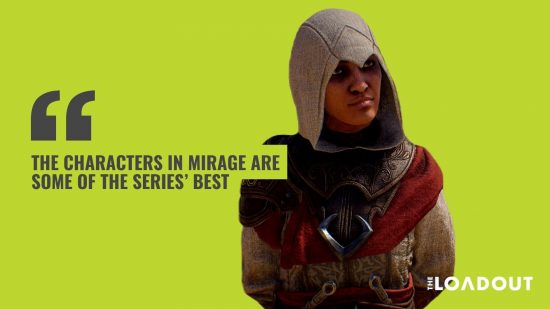Our Verdict
Ubisoft delivers a truly excellent experience with Assassin’s Creed Mirage, wonderfully blending this series’ past and present to provide players with a compact, engaging story driven by captivating characters and secrets worth seeking. It’s everything you could want from an Assassin’s Creed game and a welcome sign of things to come after a divisive few years.
Assassin’s Creed Mirage is a truly outstanding game. It delivers on its promise of paying homage to the original release, but does so in a way that elevates itself to a new standard. The characters are charming, complex and engaging. The story is impactful, compact and compelling. And, the gameplay is so satisfying, reactive and rewarding. Mirage is everything you could want from an Assassin’s Creed game and truly satisfying from start to finish.
After a slightly longer interval than usual, Ubisoft’s iconic Assassin’s Creed series is back with Assassin’s Creed Mirage – an entry paying homage to the series’ stealthy origins after six years of sprawling open-world RPGs. My first taste of Mirage, during a short hands-on preview a month ahead of launch, was sweet enough. However, I was still somewhat skeptical about it going into this Assassin’s Creed Mirage review. The moments you play through in these are cherry-picked, and the fact that it was streamed in 1080p means I was never going to be able to fully appreciate the graphical fidelity at its finest. Promising numerous open-ended assassination opportunities and the city of Baghdad to explore, though, I was still quite hopeful that AC Mirage would live up to my lofty expectations. After around 16 hours of playing, as the credits started rolling, I found myself sitting there with goosebumps. If you have any reservations at all about this game after Valhalla, you should absolutely take a chance on Assassin’s Creed Mirage – you won’t regret it one bit.
Gameplay is, without a doubt, the most divisive aspect of recent Assassin’s Creed games – I can imagine that many of you reading this disliked the drawn out, hack-and-slash action-RPG experience on offer in Origins, Odyssey, and Valhalla. I don’t mind them at all, personally, but it is sometimes hard to call them ‘Assassin’s Creed’ games – especially when you think about what was on offer before.
However, going into Mirage, Ubisoft is making it very clear that this is something of a ‘return to roots’ for the franchise – with the focus back on social stealth, assassinations, and parkour traversal. But, with Mirage being built on the same game engine as Valhalla and the gameplay itself seemingly somewhat similar, how much of a return to roots is it all really? Well, while it isn’t exactly the same as what you get – for example – with the Ezio trilogy or Unity, this really is one of the most satisfying Assassin’s Creed games yet.
In Mirage, you’ll find yourself met with all the gameplay features you know and love from the franchise’s earlier entries; you can take advantage of smoke bombs, throwing knives, crowd blending, and more throughout. However, all of these traditional features are being utilized alongside a number of RPG-era mechanics to present players with a well-rounded experience that really is the best of both worlds. You can take advantage of eagle scouting, with Basim’s companion Enkidu, and you can dart down alleyways with sprint – if you’re trying to evade the watchful eye of Baghdad’s Shurta. When you are forced to engage in open combat, you can use your attacks to chip away at your enemies’ stagger bars, weakening them. However, one successful parry and you can instantly execute them – an ingenious integration of the ever-popular counter-based combat system.
Mirage’s parkour traversal mechanics, while still not quite as slick as Syndicate and Unity, is a vast improvement on Valhalla. Basim is an agile assassin, and you really can appreciate that when you’re playing – whether you’re scaling the walls of the Round City, or crossing the canopied rooftops of Abbasiyah. When you’re slowly sneaking into a high-security area like the Damascus Gate Prison, you can take your time and carefully pick your path to avoid being spotted. However, when you need to quickly escape that same high-security area, slipping down market streets and scrambling across rooftops, you really do feel fast. The movement in Mirage is the best it has ever been in the Assassin’s Creed series; Mirage takes full advantage of Ubisoft’s Anvil game engine to deliver responsive and reactive mechanics, while ensuring that the focus is very-much on parkour and stealth-based movement. It’s really everything I love about the older Assassin’s Creed games, with a handful of modern amendments and without the sluggishness.
If you’re looking for a more traditional Assassin’s Creed experience, Mirage fits the bill nicely. However, it’s so much more than that. It’s a wonderful amalgamation of everything Ubisoft has done with the series so far – picking some of the best bits from both styles of game to deliver a well-rounded experience with equally satisfying combat, stealth, and traversal.
However, as much as Assassin’s Creed Mirage’s gameplay is great, this game isn’t driven by social stealth and dramatic assassinations. It’s really driven by characters, and the characters in Mirage are some of the series’ best.
In Mirage, Basim Ibn Ishaq isn’t the man we know and (maybe) love from Valhalla; although, that’s far from a bad thing. Lee Majdoub’s Basim is warm, humorous, and without malice. He’s wholly committed to the tenets of the Hidden Ones and, through this aspirational devotion, you’re instantly pulled into their struggles. Ubisoft doesn’t often have trouble immersing you in the narrative, and the absence of ‘modern day’ interruptions really does help you appreciate this compact yet complex narrative even more. Basim is the only protagonist this time around and he’s easily one of the most engaging characters in the series so far.
However, Basim’s light-hearted optimism is something of a mirage in itself. He’s a haunted individual, really, and this brings a wonderful complexity to his character. Basim isn’t just torn between his admirable commitment to the Hidden Ones and his steadfast loyalty to his friends, but he’s also tormented by a jinni – a lingering malevolence plaguing him with harrowing visions. Throughout Mirage, we learn the true meaning of this jinni – something Valhalla players will know all about – and Basim begins his journey into becoming the harder, more venomous man we meet as Eivor. In an effort to avoid spoilers, I won’t go into too many more details than that. However, the way this story is actually told is truly exceptional.
I knew who Basim was going to become heading into Mirage, having finished Valhalla, but I still found myself genuinely surprised – and shocked – about what happens. This is one of the most engaging narratives I have experienced in a long time, since games like Red Dead Redemption 2 and Ghost of Tsushima. I was wary that this game would feel rushed given its length, but there’s no fluff or filler here. You work your way through the ranks of the Hidden Ones and your investigation into the Order of the Ancients, with the urgency reflected in the stakes of the story. You act as swiftly as you would expect when you identify your targets and each piece of the puzzle falls into place without keeping you waiting too long
Mirage’s story, though, is really a perfect example of what this series is all about. The Hidden Ones (or Assassins) are rooting out corruption manifested by the Order of the Ancients (or Templars) and you follow the journey of an unlikely candidate as they play a pivotal role in dismantling this amoral, evil organization. However, it’s also undeniably a tragedy. You’re not just experiencing the erosion of the Order of the Ancient’s poisonous hold over the people of Baghdad, you’re also helplessly watching the erosion of the very essence of Basim’s being. While I thoroughly enjoyed experiencing this journey and Basim’s character development throughout Mirage, I can’t help but feel dejected that – even though I knew it was an inevitable development – I couldn’t stop the Basim we meet in Anbar in the prologue becoming the Basim we meet in the prologue of Valhalla.
Basim, of course, isn’t the only complex character you meet in Mirage. The supporting cast in this tragic tale is equally as interesting, presenting players with a rich and varied collection of characters, offering insight into this period of history. Of course, characters like Master Roshan and Mentor Rayhan are fictional, but Mirage also brings real 9th century figures like Muhammad ibn Abdallah ibn Tahir (governor of Baghdad at the time) and Arib Al-Ma’muniyya (regarded as the most famous slave singer to have ever resided at the Baghdad court) to life. Through them, Ubisoft brings this period of history – and the city of Baghdad – to life in a truly wonderful way.
They’re not the only thing transforming a cluster of brick buildings and a smattering of palm trees into a living, breathing city. As you might expect, the environmental interactions available in Mirage don’t do anything to rival the likes of Red Dead Redemption 2 – or any of the other best open-world games. However, this game isn’t about that, and Ubisoft does an excellent job of making the backdrop of this epic adventure exciting regardless.
Ubisoft’s attention to detail and drive to deliver an authentic representation of Baghdad and its surroundings is part of what makes Assassin’s Creed games – and, I suspect, Mirage – so timeless. These games offer us a window into the magnificence of human history, periods that the industry would otherwise likely ignore. Of course, there’s some mysticism and embellishment there, but the attention to detail really does make a difference and Mirage’s informative Codex makes that apparent.
From the worn slums of Anbar to the splendor of the Round City, Ubisoft has created a wonderfully dense environment for players to run around assassinating people in. Its varied, despite largely being one city, with each district different enough from the other to be recognizable and the wilderness surrounding the walled city of Baghdad presenting players with more than enough open space to explore. NPCs flood the streets with busy market stalls, camel caravans, and a chorus of conversations. Visually, it’s bright and beautiful. But, the one thing that stands out above all else – for me, anyway – is the sound.
If you’re rushing around from contract to contract, the sound of Baghdad might fall a little too far into the background. However, Baghdad is just so alive with sound all of the time. Whether it’s indistinct arguments between patrons of a tea house down the street, the faint sounds of birds chirping in a smattering of trees adorning the rooftop gardens overhead, or the wave of voices reciting the Adhan (the Islamic call to prayer) throughout the day, the soundscape you experience is mesmerizing. The hustle and bustle of busy cities is easy to miss in Ubisoft’s larger-scale open-world Assassin’s Creed games, but Mirage brings that stretched sense that you’re in an authentically presented environment back into focus with a city I am desperate to continue exploring, even after the main narrative has concluded.
However, as easy as I found it to let myself slip into the immersion this wonderful world offers, there were a handful of things that occasionally pulled me out of it. I know it sounds like I’m being a little picky, but – in some instances – Mirage’s graphics are a bit of a let down. In the six years since Ubisoft’s Assassin’s Creed Origins and the ‘new era’ began, there are some things that just haven’t improved much at all. Mirage does present you with some fantastic textures, particularly on outfits and weapons, and the design work is second to none. However, the facial animation outside of cutscenes isn’t as good as it could be. Not only this, but the idle animations of NPCs are often dull and the voice acting of these unimportant characters leaves a lot to be desired when compared to the main cast.
That being said, some of the cutscenes are largely fantastic and the dramatic moments are animated well enough to keep you engaged and enthusiastic throughout. When I think about the fact that Mirage is available at a lower price point than your average Assassin’s Creed game, and everything else that’s so excellent about this experience, these things feel largely insignificant. However, I can’t help but look at what Guerrilla is doing with the Horizon series, and what Insomniac is doing with Spider-Man, and wonder why Ubisoft isn’t pushing for the same level of realism in this series. With it doing everything else so right, I can’t help but feel like it deserves the same treatment here. The character models themselves are fantastic, though, which does rescue it somewhat.
Another graphical ‘feature’ that I found somewhat distracting in the opening hours of Mirage is that there’s a strange shimmer around the edges of things when you’re out in the wilderness. It’s a chromatic aberration, of sorts, that you can’t toggle or change. This appears to be an intentional attempt at representing a heat mirage, of sorts, while out exploring the sandy dunes without the overhead protection of tree canopies and sheltered rooftops – which is fine. However, I was thankful when I entered the city of Baghdad, where the effect seemed to subside. You don’t have a lot of control over the visuals in Mirage, with brightness and contrast the only two settings available alongside HDR luminance and the rather dull ‘Iconic Color Filter’ – which I was decidedly not a fan of.
Still, Mirage does an excellent job of keeping your mind off of these things and I found myself forgetting all about it within a couple of hours. Outside of the main narrative and the addictive gameplay loop, Ubisoft is fleshing out your experience with a number of interesting features and frames collectables in such a way that they don’t feel nearly as much of a chore to chase them as they did in Valhalla – for example.
However, while scouring Baghdad for lost books and pickpocketing valuable trinkets is a fun way to fill the world with things to collect, the Enigmas are where Ubisoft really makes you think. These puzzles are some of the hardest the series has produced, but that’s not as much of a bad thing as you might think. If you want to unlock all the cosmetics available, you need to take some time to solve these mysteries. It can be frustrating at times, as some of them require you to think a little outside the box, but the satisfaction and sense of accomplishment you get when you solve one rivals that of a perfectly-executed assassination attempt.

This sense of satisfaction, though, permeates all aspects of Assassin’s Creed Mirage. Its gameplay, whether you’re sneaking around or stabbing everyone in sight, is beyond satisfying; a huge improvement on Valhalla’s offering. When it comes to the story, Ubisoft keeps everything compact and you’re not left waiting too long to find out what the next major plot point is – which is, again, wonderfully satisfying. Everything else, from the exploration to the Enigmas, is excellent. This is, without a doubt, one of the best Assassin’s Creed games I’ve ever played.






